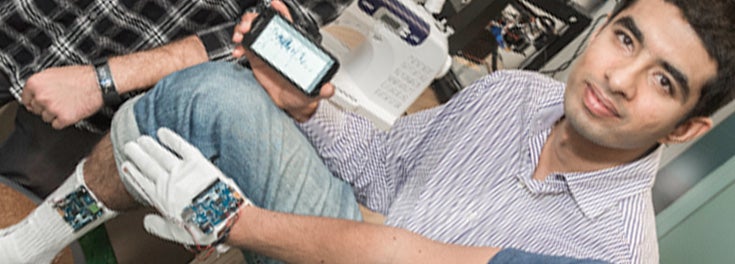 Prescribing a medication plan for a patient with Parkinson’s disease is a big challenge for doctors, but now a URI biomedical engineering professor and his students are making strides in solving that problem.
Prescribing a medication plan for a patient with Parkinson’s disease is a big challenge for doctors, but now a URI biomedical engineering professor and his students are making strides in solving that problem.
Assistant Professor Kunal Mankodiya, director of URI’s Wearable Biosensing Laboratory, is researching how to transform gloves, socks, clothing, and even shoes into high-tech items that will improve their lives.
“We are in the era of game-changing technology, especially in health care,’’ says Mankodiya. “URI’s College of Engineering is pioneering new medical devices that will change the way people receive medical care.’’
URI’s College of Engineering is pioneering new medical devices that will change the way people receive medical care.
Mankodiya’s research focuses on smart textiles—wearable items embedded with sensors, electronics, and software that can collect data from patients, even though they are at home, and deliver it to doctors. The benefit is that doctors will be able to make more informed decisions remotely, and patients will be more involved with their care.
The professor and his team of students have been working on “smart wearables’’ for years as part of their research on the “Internet of Things,’’ a framework to automate human interactions with Cloud computing. One creation that made headlines last year was a wristband that monitors the tremors of Parkinson’s patients and sends that information to doctors over an Internet connection.
This year, the team is turning its attention to textiles, designing items for patients with neurological illnesses. The gloves are the latest project. They are embedded with sensors on the fingers and thumb that measure tremors and rigidity—common symptoms of Parkinson’s. The gloves are connected to cell phones, which process the data and deliver it to neurologists in their offices. This way, doctors can manage the treatment plan of the patient day-to-day, ensuring that medication is working properly and eliminating the need for patients to make stressful clinical visits.
“Patients with Parkinson’s face many mobility issues—driving and even walking long distances,’’ Mankodiya says. “The glove will give patients the option of receiving health care while remaining at home, and it also reduces the risk of falls and other accidents.’’
Mankodiya is also working on high-tech socks for people who have suffered strokes. Again, sensors and software woven into the fabric relay information about a patient’s gait to doctors and physical therapists so they can tailor rehabilitation therapy to each patient.
Other projects focus on developing tools to image, sense, and record brain function to treat Parkinson’s, as well as other neurological diseases, like epilepsy. The projects were made possible through National Science Foundation grants, one of which involves collaboration with Walter Besio, associate professor of biomedical engineering.
Mankodiya is also partnering with Lifespan Hospitals to create smartwatch technologies for patients with psychiatric illnesses and autism. Although research is still in the early stages, the watches are expected to measure the patients’ daily behavior and activities.
“URI is an energetic institution that makes it possible for professors like me to think outside the box,’’ says Mankodiya. “We all want to create a next generation of engineers who are highly skilled—and compassionate.’’
Matt Constant, a junior computer engineering major, is included in that next generation of engineers. He is currently working on the smartwatch app, as well as the glove. “It’s very fulfilling,’’ he says. “It’s exciting working on important problems like this at such a young age.’’
